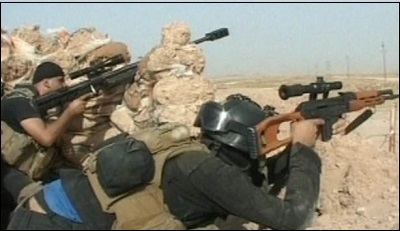
|
|

|
|
| April 20, 2024 |
|
Syrian warplanes strike in western Iraq, killing at least 50 people 
BAGHDAD--Syrian warplanes struck targets in the western Iraqi province of Anbar on Tuesday, killing at least 50 people as foreign allies of Baghdad's Shiite-dominated government sought to shore up the crumbling Iraqi armed forces and curb the advances of Sunni insurgents.
More than 132 other people were also wounded when bombs hit the municipal building, a market and a bank in the district of Al Rutba, according to a provincial official and Mohammed Al Qubaisi, a doctor in the district's main hospital. It was the second consecutive day of airstrikes by Syria, which has joined Iran in coming to the aid of the embattled Baghdad government. Tehran has deployed special forces to help protect the capital and the Iraqi cities of Najaf and Karbala, which Shiites revere. In recent days, Sunni militants led by the Islamic State of Iraq and al-Sham have seized key towns in Anbar province, a Sunni Muslim stronghold, giving them unchecked sway over hundreds of miles of territory spanning the Iraqi-Syrian border as they fight to carve out an Islamic emirate. Abdullah Al Shimmari, the member of the Anbar Tribal Military Council, which is aligned with ISIS, denounced Syrian-Iranian involvement in Iraq and vowed retaliation. "We are now facing aggressive Iranian attacks at Arab hands," Mr. Al Shimmari said. "Our response to that will be soon." As foreign supporters of Iraqi Prime Minister Nouri al-Maliki undertook to buttress his government, the country's local tribal leaders emerged further as key political players in helping to stem bloodshed and restore a modicum of stability in areas of Iraq once controlled by Baghdad. In the western city of Haditha, tribal leaders were in talks on Tuesday with ISIS militants to negotiate the surrender of Iraqi security forces and to prevent damage to a nearby dam on the Euphrates that generates hydroelectric power for large parts of the country. SIS controls towns to the east and west of Haditha, leaving the city and the troops deployed there virtually surrounded. The rebels were demanding the turnover of dozens of veterans of the U.S.-sponsored forces, known collectively as the Awakening movement, that successfully repelled al Qaeda fighters in 2007 and 2008, local security sources said. The mediation in Haditha was taking place only hours after local tribal leaders negotiated the peaceful surrender of the last of the Iraqi soldiers trapped in the oil refinery at Beiji. The agreement between tribal sheiks and ISIS fighters, reached late Monday, ensured the safe passage of government soldiers from Iraq's largest oil refinery, which fell under the militants' control over the weekend, a tribal leader in Beiji said by telephone. As government troops surrendered their weapons to ISIS and left for the semiautonomous northern Kurdistan region, Sunni militants celebrated at the plant and in the nearby town of Beiji, shooting their rifles into the air and using loudspeakers to proclaim their victory, residents said. State-run Al Iraqiyya television station, in reports aired Tuesday, continued to insist that the refinery was under the control of Baghdad and would "start to operate again within days." At least 1,075 people, many of them civilians, have been killed in the past 2½ weeks during fighting in the provinces of Nineveh, Diyala and Salah Al Din, the U.N. said Tuesday. (Source: The Wall Street Journal) Story Date: June 25, 2014
|